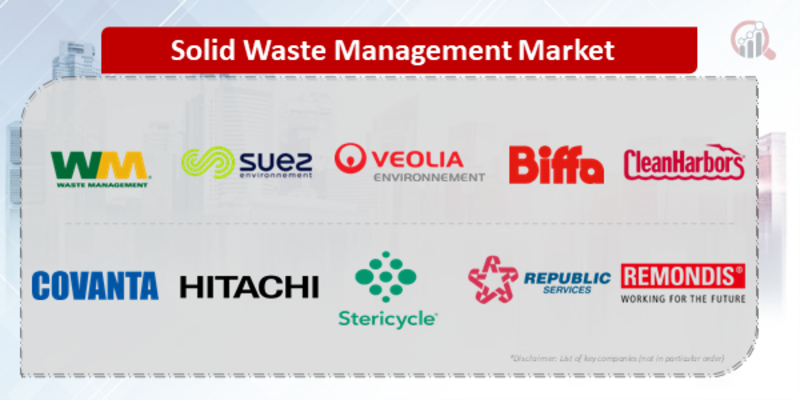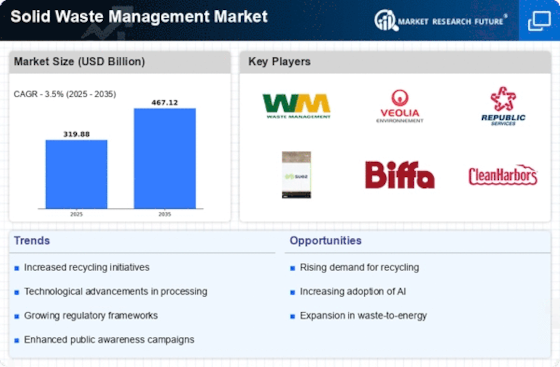Top Industry Leaders in the Solid Waste Management Market

*Disclaimer: List of key companies in no particular order
Top listed global companies in the Solid Waste Management industry are:
Waste Management Inc. (USA)
SUEZ Group (France)
Veolia Environment S.A. (France)
Biffa PLC (U.K.)
Clean Harbors Inc. (USA)
Covanta Holdings Corporation (USA)
Hitachi Zosen Corporation (Japan)
Remondis AG & Co. Kg (Germany)
Republic Services Inc. (USA)
Stericycle Inc. (USA)
Advanced Disposal Services Inc. (USA)
ALBA Group (Germany)
Recology (USA)
TANA Oy (Finland)
Envac Group (Sweden)
Bridging the Gap by Exploring the Competitive Landscape of the Solid Waste Management Top Players
The global solid waste management market driven by population growth, rapid urbanization, and stringent environmental regulations. This burgeoning market presents both challenges and opportunities for players competing within its diverse landscape.
Key Player Strategies:
- Diversification: Established players like Waste Management and Republic Services are expanding their portfolios beyond traditional collection and disposal services, investing in recycling, composting, and waste-to-energy technologies. This helps them cater to the growing demand for sustainable solutions and mitigates potential threats from niche players specializing in these areas.
- Technological Prowess: Embracing cutting-edge technologies like AI-powered route optimization, automated sorting systems, and big data analytics for waste characterization is crucial for optimizing operations, reducing costs, and enhancing efficiency. Companies like SUEZ and Veolia Environmental Services are leading the charge in this direction.
- Strategic Acquisitions: Mergers and acquisitions offer opportunities for consolidation, expanding geographical reach, and acquiring specialized expertise. Biffa's acquisition of Interserve's waste business in the UK is a prime example of this strategy.
- Partnerships and Collaborations: Collaborating with startups, research institutions, and government agencies allows established players to leverage innovation, navigate regulatory complexities, and tap into new markets. Waste Management's partnership with IBM to develop AI-powered waste collection solutions exemplifies this collaborative approach.
Factors Influencing Market Share Analysis:
- Geographical Presence: Companies with strong regional footprints and established infrastructure hold an advantage in terms of market share. Biffa's dominance in Europe and Waste Management's extensive network in North America are illustrative.
- Service Portfolio Breadth: Players offering a comprehensive range of services, including collection, transportation, disposal, recycling, and composting, are well-positioned to cater to diverse client needs and secure larger contracts.
- Technological Advancements: Early adoption and successful implementation of innovative technologies can enhance operational efficiency, cost-effectiveness, and sustainability, giving such companies a competitive edge.
- Client Focus and Customer Care: Building strong relationships with clients, offering customized solutions, and ensuring reliable service delivery are critical factors in retaining market share and attracting new customers.
Emerging Trends and Disruptive Forces:
- The Rise of the Circular Economy: The shift towards a circular economy, where waste is minimized and resources are reused and recycled, is presenting exciting opportunities for companies developing innovative recycling and waste-to-resource technologies. This trend poses a challenge to traditional disposal-centric businesses.
- Decentralization and On-site Treatment: Decentralized waste treatment solutions like anaerobic digestion and composting at source are gaining traction, particularly in densely populated areas. This could potentially disrupt traditional centralized waste management models.
- Technological Disruption: The emergence of startups offering AI-powered waste management solutions, blockchain-based waste tracking systems, and robotic sorting technologies is disrupting the market and forcing established players to adapt and innovate.
Overall Competitive Scenario:
The solid waste management market is characterized by intense competition between established players, regional giants, and niche players specializing in sustainable technologies. Success in this dynamic landscape requires a balanced approach focusing on portfolio diversification, technological adoption, strategic partnerships, and a client-centric approach. The ability to adapt to emerging trends, embrace innovation, and navigate the shift towards a circular economy will be key for companies to secure and maintain their competitive edge in the years to come.
This analysis provides a high-level overview of the competitive landscape within the solid waste management market. Further research specific to your region or area of interest can delve deeper into the nuanced dynamics and identify potential opportunities within this ever-evolving sector.
Latest Company Updates:
Waste Management Inc. (USA):
- November 2023: Acquired Blue Ridge Waste Industries, expanding landfill and hauling operations in Southeast US. (Source: Waste Management press release)
SUEZ Group (France):
- December 2023: Signed contract with Singapore to build and operate a new waste-to-energy plant. (Source: SUEZ press release)
Veolia Environment S.A. (France):
- January 2024: Acquired EOL, a major waste management company in Australia. (Source: Veolia press release)
Biffa PLC (U.K.):
- December 2023: Expanded plastic recycling capacity with acquisition of Total Recycling Ltd. (Source: Biffa press release)











